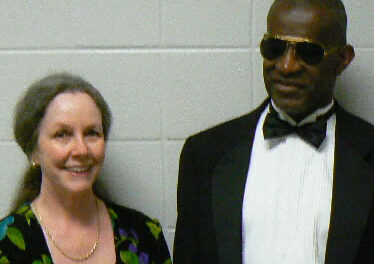There are spirits in this place. The place is the Pyrle Theatre in downtown Greensboro. The spirits are part of Triad Stage’s newest production, the world premiere of Providence Gap. They drift down a mountain hollow, rustle the treetops, and rush like a brook from scene to scene.
Of course, these spirits are all actors — aren’t they?
Such is the mysteriousness of Providence Gap: a dream state from which you don’t want to be stirred, a story that encompasses many stories, lives, and emotions, collected into one musical, mystical, miraculous play.
Through the hazy, vaporous mountain air of Providence Gap, a small Appalachian town, this play materializes as an important new work by Triad Stage co-founder and artistic director Preston Lane and co-writer Laurelyn Dossett. The two writers have collaborated before on the popular Brother Wolf, Bloody Blackbeard, and Beautiful Star: An Appalachian Nativity.
In Providence Gap, their immense talents not only as individuals, but as collaborators, merge in a synchronicity that will turn even the most cynical regional theatergoer into a believer. It’s a piece meant to spotlight all things Carolina: music, geography, names, even botanical folklore. From the Appalachian town of Providence Gap to the Piedmont mill town of Hawburg (ever heard of Glencoe?), it’s a travelogue of home and history, set in the turbulent years from 1894 to 1931.
But don’t assume this play is rooted in one place or time; in fact, don’t assume anything. Ambiguity is the word. Audiences are transported between Carolina regions, continents and, some would say, other ethereal planes.
The plot revolves around a central question: Is it chance, luck, or fortune that makes a man? Our hero, the ever-optimistic orphan Chance, is played by a sincere TJ Austyn, a University of North Carolina at Greensboro BFA grad and a Triad Stage veteran. Austyn has also performed with the N.C. Shakespeare Festival and is the perfect hometown guy for this part.
A character such as Chance requires a soft theatrical touch, and Austyn has it: characters whirl around him in a briar patch of emotions, but Austyn convinces us of his belief that he is a man upon whom Providence smiles. And when gaps in that providence occur, as they inevitably do, Austyn gives an emotional performance that is soul-baring and gut-wrenching.
Ginny Myers Lee as Burlene Critcher provides the balance to Chance’s optimism. Bitter, bilious, and downright evil, she’s the foil who draws characters such as Narvel (the marvelous Matthew Delaney) into her wicked web. She, too, evolves; and her ending is as much of a surprise as anything in the play.
Supporting characters supply the backbone to this play and bring a cohesiveness that’s difficult to sustain in a work of more than two-and-a-half hours, including intermission. We hang on every word, every Southern twang, every shotgun and rifle report.
There’s Christine Morris as a mountain woman whose next stop should be a role in the musical Hair. Morris’ film and theatrical work is nothing to sniff at, and she’s also voice and dialect coach for Triad Stage; that’s appropriate, because her voice timbre and accent is spot-on for a character who could easily slip into hyperbole.
There are other strong women in this play: Leah Turley (a UNCG MFA candidate) as Fortune, Chance’s true love, and Katie Vohwinkle (also a UNCG student) as his daughter Lucky. The young Lucky is played with amazing poise by six-year-old Amy Feldmann.
There are many tender moments in this play, but few as stirring as a broken-hearted Chance’s memories, played out in a video on the stage floor. Tears are not an uncommon thing among audiences of Triad Stage, and this ingenious scene certainly precipitated a few.
Triad Stage vet Cinny Strickland proves she can be as viral as a whorehouse madam as she was sugary sweet in “Beautiful Star.” Michael Abbott, Jr., a North Carolina School of the Arts grad and visiting prof, gives a rousing Uncle Sam, along with other supporting roles. Matt Palmer as Estil Lovell scarcely utters a word, but his geatures, mannerisms and facial expressions are completely convincing.* And one would be remiss not to mention Anthony W. Scarsella as the radio announcer and our travel guide, of sorts, from the borderland radio station XSTX (named for the River Styx, perhaps?).
Acting aside, it is Laurelyn Dossett’s voice and music that catapult this play from extraordinary to transcendent. Yes, there are shades of Emmylou Harris and June Carter Cash here; but Dossett’s voice is purely her own, and pure it surely is. It’s worth the ticket price just to hear her sing. Accompanied by Greensboro fave Scott Manring and Georgia native Carl Jones, Dossett and her 13 songs are not to be missed
As for Lane, as Triad Stage-goers know, he never met an allegory he didn’t like; and we love him for it. Is it chance, luck, or fortune that brought Greensboro a duo like Lane and Dossett? Probably all of the above, but don’t sit and ponder. These two are treasures, and we should not take their efforts for granted. They have brought to Greensboro a world-class world premiere, and we should rally ‘round them on their journey.
Providence Gap continues Tuesday-Sunday through July 4th at Triad Stage. See our calendar for details.
*Updated 6/18/10.











